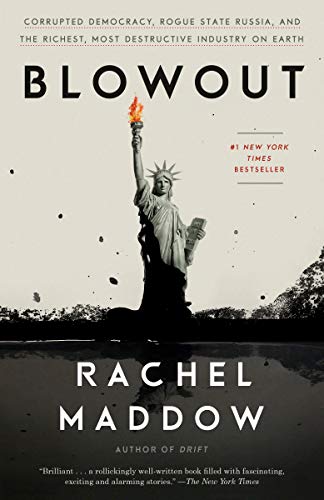10 Best-Selling Democracy Books Millions Love
Top recommendations from Ari Melber, Joy Reid, and Paul Krugman highlight these best-selling Democracy Books offering expert-backed insights and proven approaches.







When millions of readers and top experts agree on the impact of certain books, it’s worth paying attention. Democracy remains a pivotal topic, shaping societies and influencing global politics, and these best-selling books have found their way into the hands of those eager to understand or defend it. Their proven value lies not only in popularity but in how they illuminate complex democratic ideas and challenges in accessible ways.
Experts like Thebeat W/Ari Melber, host of MSNBC's "The Beat," and Joy Reid, political commentator and host at MSNBC, have highlighted titles such as Rachel Maddow’s Blowout for its incisive look at how energy politics intertwines with democracy. Meanwhile, Paul Krugman, a Nobel laureate economist, and Michael Mcfaul, a former U.S. Ambassador to Russia, endorse How Democracies Die for its rigorous analysis of democratic erosion and institutional decay.
While these popular books provide proven frameworks, readers seeking content tailored to their specific Democracy needs might consider creating a personalized Democracy book that combines these validated approaches with your unique interests and goals.
Recommended by Thebeat W/Ari Melber
MSNBC host, political journalist
“.@maddow's book, #Blowout, is now number one on The @nytimes Best Seller List for the second week in a row!” (from X)
by Rachel Maddow··You?
Rachel Maddow's background as an Emmy-winning political commentator and Oxford-educated political scientist clearly shapes her examination of the oil and gas industry's corrosive impact on democracy worldwide. You’ll encounter detailed accounts of how energy corporations fuel corruption and authoritarianism, including Russia's geopolitical maneuvers tied to its fossil fuel wealth. The book challenges you to consider the intersection of economic power and political influence, especially through chapters dissecting events like the 2016 election interference. If you’re interested in the mechanics behind democratic erosion and the global stakes of energy politics, this book offers sharp insights, though it may feel dense if you're seeking light reading.
Recommended by Roger Bennett
NBC Gent, co-host of Men In Blazers
“The book which helped me best understand the tectonic plates shifting in the world around us” (from X)
by Anne Applebaum··You?
by Anne Applebaum··You?
What if everything you knew about liberal democracies' stability was wrong? Anne Applebaum, a Pulitzer Prize-winning historian noted for her deep dives into Soviet history, explores why elites in democracies worldwide are increasingly drawn to nationalism and authoritarianism. You learn to recognize the psychological and social factors that make simple, exclusionary political narratives appealing, especially to those who see themselves as loyal insiders. Chapters dissect the rise of autocratic tendencies across the US, Britain, and Europe, revealing how democratic values erode from within. This book benefits anyone keen on understanding the fragile dynamics threatening modern democratic systems and the subtle forces reshaping political landscapes.
by TailoredRead AI·
This tailored book explores battle-tested approaches to active participation and democratic impact, offering a personalized journey through the most effective ways to influence democratic change. It combines widely validated knowledge with your unique interests and background to create a focused exploration of civic engagement, political advocacy, and grassroots activism. The book examines the dynamics of democratic systems, citizen empowerment, and strategies for fostering meaningful community involvement, all while matching your specific goals and preferences. Through this tailored content, you gain a deeper understanding of democratic processes and practical ways to contribute to positive societal change, making your learning experience both relevant and inspiring.
Recommended by The New Yorker
“The political-science text in vogue this winter is How Democracies Die.”
by Steven Levitsky, Daniel Ziblatt··You?
by Steven Levitsky, Daniel Ziblatt··You?
What started as an academic inquiry by Harvard professors Steven Levitsky and Daniel Ziblatt evolved into a detailed examination of how democracies unravel, often not with dramatic coups but through a slow erosion of institutions and political norms. You learn to recognize warning signs like weakened judiciary independence and attacks on the press, illustrated by case studies from 1930s Europe to modern examples in Turkey and Venezuela. The book offers a sober analysis useful for anyone interested in political stability, democracy preservation, or understanding current American politics in a global context. If you want to grasp why democracies fail and what warning signs to watch, this book provides clear, historically grounded insights without political bias.
by Alexis de Tocqueville, Isaac Kramnick, Gerald Bevan·You?
by Alexis de Tocqueville, Isaac Kramnick, Gerald Bevan·You?
What happens when a keen French aristocrat embarks on a deep exploration of early 19th-century America? Alexis de Tocqueville offers more than travelogue; he provides a nuanced examination of American democratic institutions and social dynamics, revealing how equality and liberty interweave in a young nation. You’ll find detailed observations on topics like local governance, civil society, and the tensions between individualism and community, making this a rich study for anyone interested in political science or history. The inclusion of lesser-known essays like "Two Weeks in the Wilderness" adds vivid context to Tocqueville's insights, making it especially valuable for those wanting to grasp the roots of modern democracy.
by Richard C Lyons·You?
by Richard C Lyons·You?
Drawing from his background as an American poet, Richard C. Lyons compiles a rich tapestry of historical episodes in "The DNA of Democracy," exploring how the forces of tyranny and democracy have intertwined through time to shape modern governance. You’ll encounter detailed narratives from ancient Israel’s Ten Commandments to the overthrow of kings in England and America, providing a framework to recognize the patterns of oppressive rule and democratic resistance. Lyons doesn’t just recount history; he offers a blueprint to identify tyranny’s traits today, illustrating this with vivid examples like Rome’s Twelve Tables and the Athenian Constitution. This book suits anyone seeking a deeper understanding of democracy’s roots and the persistent struggle for power across civilizations.
by TailoredRead AI·
This tailored book explores step-by-step actions for rapid and effective democratic engagement, crafted specifically to align with your interests and background. It examines practical avenues for participation, from understanding local governance to organizing community efforts, all focused on fostering meaningful involvement within a compressed 30-day timeframe. By weaving in insights validated by millions of readers, this personalized guide reveals how you can navigate democratic processes with confidence and immediacy. Its tailored approach ensures the content matches your specific goals, providing a focused learning experience that emphasizes actionable democratic participation without overwhelming detail. You'll find a clear path to becoming an engaged citizen equipped for real-world impact.
by Sami Sage, Emily Amick·You?
by Sami Sage, Emily Amick·You?
What started as a collaboration between Emily Amick, a lawyer with Senate leadership experience, and Sami Sage, a media entrepreneur, became a refreshing take on civic engagement that blends personal growth with political action. You’ll explore how your unique values and abilities align with the democratic process, making activism feel manageable and authentic rather than overwhelming. The book walks you through understanding the political system, discovering meaningful roles for yourself, and taking steps—big or small—to influence change, all grounded in real-life stories and interactive exercises. If you’ve felt stuck or powerless amid political chaos, this guide offers a practical way to reclaim your agency and sustain your commitment without burnout.
by Elizabeth Graham·You?
by Elizabeth Graham·You?
What if everything you knew about the threats to democracy was wrong? Elizabeth Graham explores the insidious ways foreign influence and domestic allies have chipped away at American democratic institutions. Drawing on detailed historical incidents and intelligence reports involving figures like Vladimir Putin and Donald Trump, the book sheds light on tactics such as propaganda, cyberattacks, and political manipulation. You’ll gain a clearer understanding of how these strategies intertwine with modern political dynamics, offering insights relevant to anyone concerned about safeguarding democratic values today. This book suits readers interested in contemporary political challenges rather than purely academic theory.
by Alexis de Tocqueville, Arthur Goldhammer·You?
by Alexis de Tocqueville, Arthur Goldhammer·You?
What happens when a French aristocrat deeply observes American society during its early republic? Alexis de Tocqueville's Democracy in America offers a vivid exploration of social equality and its political consequences, grounded in his 1831 visit focused initially on penitentiary systems. You gain insights into how widespread property ownership shapes democracy, the tensions majority rule creates for liberty, and the nuanced role religion and civil institutions play amid rising individualism. Tocqueville’s reflections on racial division, slavery, and prejudice remain strikingly relevant, making this more than history—it’s a lens for understanding democracy’s enduring challenges. This volume, enhanced by Arthur Goldhammer’s translation, captures both the literary style and political depth essential for anyone grappling with democratic theory or practice.
by Brian Tyler Cohen·You?
Brian Tyler Cohen, known for being the first content creator to interview President Biden and a prominent progressive voice, steps away from daily headlines to dissect the unraveling of American politics. In this book, you gain insight into the deliberate strategies and contradictions of the modern Republican Party, including how they exploit historical branding and media sensationalism. Cohen offers a candid look at the political landscape, highlighting the challenges posed by the radical right and media complicity, while outlining what Democrats can do to restore balance. If you're engaged in understanding current political dysfunction and its impact on democracy, this book provides a clear-eyed narrative that doesn't shy away from uncomfortable truths.
by Norbert Kersting·You?
by Norbert Kersting·You?
Norbert Kersting, a seasoned political scientist, offers a nuanced survey of electronic democracy that goes beyond simple enthusiasm for digital participation. You get a detailed look at how technology reshapes political engagement, from internet voting systems to the challenges of the digital divide. Through critical analysis, Kersting invites you to question whether digital tools truly enhance transparency and participation or create new barriers. The book suits anyone interested in the intersection of technology and politics, especially those curious about the promises and pitfalls of e-democracy in a global context.
Proven Democracy Methods Personalized ✨
Get expert-backed strategies tailored to your unique Democracy interests and goals.
Trusted by thousands of Democracy enthusiasts worldwide
Conclusion
These 10 books collectively trace democracy's origins, its current challenges, and the evolving threats it faces, offering frameworks that have resonated widely. If you prefer proven methods grounded in historical and contemporary analysis, start with Democracy in America and The DNA of Democracy. For validated approaches on democratic decline and authoritarian threats, combine How Democracies Die with Twilight of Democracy.
For those interested in the intersection of democracy with energy politics and digital innovation, Blowout and Electronic Democracy provide perspectives that deepen understanding of modern influences. Alternatively, you can create a personalized Democracy book to combine proven methods with your unique needs.
These widely-adopted approaches have helped many succeed in grasping the complex dynamics of democracy today, offering insight, clarity, and actionable knowledge for readers who want to stay informed and engaged.
Frequently Asked Questions
I'm overwhelmed by choice – which book should I start with?
Start with Democracy in America and Two Essays on America for foundational insights, then explore How Democracies Die to understand current challenges. These offer a solid base before diving into more specialized topics.
Are these books too advanced for someone new to Democracy?
Not at all. Many, like Democracy in Retrograde, are designed to be accessible for newcomers, blending personal stories with clear explanations of democratic concepts.
What's the best order to read these books?
Begin with historical and theoretical works such as Alexis de Tocqueville, then move to contemporary analyses like Blowout and Shameless to see democracy in today's context.
Should I start with the newest book or a classic?
Both have value. Classics like Democracy in America provide enduring principles, while newer titles address modern threats and dynamics, giving you a full picture.
Do I really need to read all of these, or can I just pick one?
You can pick based on your interests—choose Blowout for energy politics or Electronic Democracy for digital aspects. Each book offers focused insights relevant to different facets of democracy.
How can I get content tailored to my specific Democracy interests or experience level?
While these expert books offer broad and deep insights, you might consider creating a personalized Democracy book. It combines proven methods with your unique goals and expertise for a more targeted learning experience.
📚 Love this book list?
Help fellow book lovers discover great books, share this curated list with others!
Related Articles You May Like
Explore more curated book recommendations









